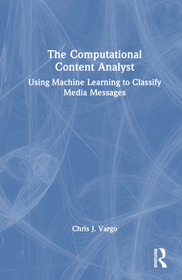
The Computational Content Analyst
Using Machine Learning to Classify Media Messages
-
10% KEDVEZMÉNY?
- A kedvezmény csak az 'Értesítés a kedvenc témákról' hírlevelünk címzettjeinek rendeléseire érvényes.
- Kiadói listaár GBP 135.00
-
64 496 Ft (61 425 Ft + 5% áfa)
Az ár azért becsült, mert a rendelés pillanatában nem lehet pontosan tudni, hogy a beérkezéskor milyen lesz a forint árfolyama az adott termék eredeti devizájához képest. Ha a forint romlana, kissé többet, ha javulna, kissé kevesebbet kell majd fizetnie.
- Kedvezmény(ek) 10% (cc. 6 450 Ft off)
- Kedvezményes ár 58 047 Ft (55 283 Ft + 5% áfa)
Iratkozzon fel most és részesüljön kedvezőbb árainkból!
Feliratkozom
64 496 Ft

Beszerezhetőség
Becsült beszerzési idő: A Prosperónál jelenleg nincsen raktáron, de a kiadónál igen. Beszerzés kb. 3-5 hét..
A Prosperónál jelenleg nincsen raktáron.
Why don't you give exact delivery time?
A beszerzés időigényét az eddigi tapasztalatokra alapozva adjuk meg. Azért becsült, mert a terméket külföldről hozzuk be, így a kiadó kiszolgálásának pillanatnyi gyorsaságától is függ. A megadottnál gyorsabb és lassabb szállítás is elképzelhető, de mindent megteszünk, hogy Ön a lehető leghamarabb jusson hozzá a termékhez.
A termék adatai:
- Kiadás sorszáma 1
- Kiadó Routledge
- Megjelenés dátuma 2024. december 2.
- ISBN 9781032846354
- Kötéstípus Keménykötés
- Terjedelem144 oldal
- Méret 229x152 mm
- Súly 453 g
- Nyelv angol
- Illusztrációk 1 Tables, black & white 727
Kategóriák
Rövid leírás:
This guide gives researchers the tools they need to amplify their analytical reach through the integration of content analysis with computational classification approaches, including machine learning and the latest advancements in generative AI and Large Language Models (LLMs). It is particularly useful for academic researchers and students.
TöbbHosszú leírás:
Most digital content, whether it be thousands of news articles or millions of social media posts, is too large for the naked eye alone. Often, the advent of immense datasets requires a more productive approach to labeling media beyond a team of researchers. This book offers practical guidance and Python code to traverse the vast expanses of data—significantly enhancing productivity without compromising scholarly integrity. We’ll survey a wide array of computer-based classification approaches, focusing on easy-to-understand methodological explanations and best practices to ensure that your data is being labeled accurately and precisely. By reading this book, you should leave with an understanding of how to select the best computational content analysis methodology to your needs for the data and problem you have.
This guide gives researchers the tools they need to amplify their analytical reach through the integration of content analysis with computational classification approaches, including machine learning and the latest advancements in generative artificial intelligence (AI) and large language models (LLMs). It is particularly useful for academic researchers looking to classify media data and advanced scholars in mass communications research, media studies, digital communication, political communication, and journalism.
Complementing the book are online resources: datasets for practice, Python code scripts, extended exercise solutions, and practice quizzes for students, as well as test banks and essay prompts for instructors. Please visit www.routledge.com/9781032846354.
“The Computational Content Analyst opens new research frontiers using highly sophisticated computer-based approaches that greatly expand the substantive depth and scope of quantitative content analysis. These approaches vastly improve scholars’ ability to examine the large body of content available on the internet.”
- Maxwell McCombs, University of Texas at Austin, USA
“The Computational Content Analyst provides a practical and informative guide for scholars and practitioners aiming to learn the basics of computational approaches to analyzing text. This book is practical and insightful; Vargo makes a complex topic accessible through insightful examples and useful research case studies.”
- Matthew Weber, Rutgers University, USA
“This book makes computational content analysis as easy as following a recipe.”
- Milad Minooie, Kennesaw State University, USA
TöbbTartalomjegyzék:
Preface 1. Unveiling Content Analysis in the Contemporary Media Ecosystem 2. Designing a Computational Content Analysis: An Illustration from "Civic Engagement, Social Capital, and Ideological Extremity" 3. Basic Information Retrieval for Content Analysis 4. Supervised Machine Learning with BERT for Content Analysis 5. Text Classification of News Media Content Categories Using Deep Learning 6. Leveraging Generative AI for Content Analysis 7. Unveiling the Veiled: Topic Modeling as a Lens for Discovery 8. Extending Deep Learning to Image Content Analysis Appendix A: Codebook and Conceptual Definitions Appendix B: Deletion Themes
Több



